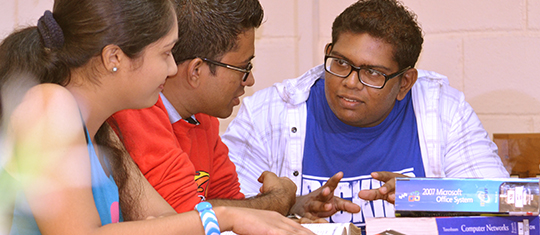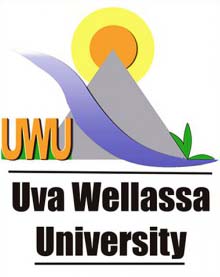
The Uva Wellassa University (UWU) is recognised as an ‘Entrepreneurial University’, in addition to being the “Centre of Excellence for Value Addition to National Resources Base”. It is the newest public University established by the Government of the Sri Lanka in order to expand higher education in the country. Since its inception in 2006, UWU has been expanding every year as a response to the ever-growing demand for higher education in the country. The UWU is supported by the government through the Ministry of Higher Education to fulfill a national mandate of providing high quality education and service as reflected in its motto of “Service and Excellence”. The goal of the university is to effectively contribute to national development, through value addition to the local resources base. To achieve this, the University Act provides for and spells out teaching, research and service as the main functions of a public University. The University has been carrying out research since its inception. The research has been internally and externally supported. Internally supported research is funded by the University Research Grants. Externally supported research is funded by the resource from commissioned research through Memorandum of Understanding (MoU)/agreement with local, regional and international bodies, MoU/ agreements with other Universities, Institutes, Centers and Units. The Faculties of the University have undertaken various research projects that address issues relevant to national development. These research projects have resulted into publications of repute and some of the research outputs into applications in the various sectors of the Sri Lankan economy. UWU’s Strategic Plan recognises the importance of research in the advancement of knowledge in relation to value addition on both goods and services, provision of a repertoire of evidence based information and facilitation of international academic collaboration. In addition for the University to derive tangible benefits from the intellectual output of its research and to ensure sustainable research activities at the University, it is important that research income is generated from the respective research findings through technology transfer and commercialization of works, innovations and inventions. This can be achieved through the intellectual property systems that allow for the protection, enforcement and commercialization of research findings. In this regard, this policy must be implemented in tandem with the Intellectual Property Rights (IPR) policy document adopted by the University.
Rationale for Policy -
In the past, research activities have not been well managed particularly with respect to coordination at the central level. Institutional mechanism for storage, retrieval and dissemination of the research outcomes are inadequate and need attention. The UWU has not had a coherent Research Policy document of guide and regulate the conduct of research for academic members of staff and undergraduate students. Most of the research outputs have not fed into national development, enhanced teaching and curricula development in the University.
The UWU Research Policy has been necessitated by the requirement to coordinate the expanding research activities efficiently and effectively. The Research Policy, therefore, is motivated by, inter alia, the following specific factors:
Growth of degree programmes;
Need to enhance internally and externally sourced funding;
Need for improved research administrative infrastructure;
Need for research regulatory framework and oversight particularly with respect of ethical requirements;
Need to improve accountability and transparency for fiscal and administrative management of research activities;
Need to accelerate the development of research that ultimately results in contributing to the development of national economy through value adding to the local resources base in Sri Lanka
Need for strong infrastructure and mechanisms to support more effective collaboration and partnerships with other universities and institutions within Sri Lanka and aboard.
In view of the needs highlighted above and the deficiencies identified, it became imperative for a coherent policy document to be developed in order to inform and guide the conduct of both locally and internationally sponsored research activities in the University.


